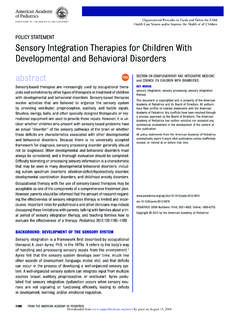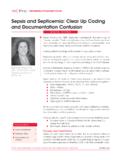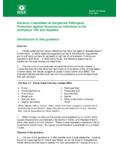Transcription of Stroke and Cognitive Impairment
1 Medical Care Corporation Simple and Accurate Memory Assessment (888)565-5535 Stroke and Cognitive Impairment Stroke is the second most common cause of Cognitive Impairment and dementia. The accumulation of lacunar infarcts, ischemic white matter disease and cerebral hypoperfusion are the most common causes of Cognitive Impairment /dementia due to Stroke that can go unrecognized for up to 30 years, by which time there is substantial Impairment (9-11,16,17). These types of Stroke predominantly affect the connections between areas of cortex that associate complex types of information, the disruption of which leads to impaired cognition and function. Larger strokes are usually detected clinically and Cognitive Impairment is thus more likely to be detected early on.
2 Detecting Stroke early allows initiation of the appropriate treatment that can prevent or substantially delay the onset and progression of Cognitive Impairment /dementia. How Much Stroke Can Cause Cognitive Impairment ? The smallest amount of Stroke necessary to cause Cognitive Impairment /dementia is greater than 10 ml and less than 50 ml (6,15), which amount to between 1% and 4% of the brain s volume. Cognitive Impairment /dementia can result from Stroke volumes smaller than 10 ml when they affect the hypothalamus, thalamus, brainstem or hippocampus. Cognitive Deficits The most common types of Cognitive deficits arising from Stroke are disturbances of attention, language syntax, delayed recall and executive dysfunction affecting the ability to analyze, interpret, plan, organize, and execute complex information (7,8,12,14).
3 The risk of vascular Cognitive Impairment and dementia as well as the rate of Cognitive decline in cerebrovascular disease is highly dependent upon the control of the underlying risk factors for Stroke (4). If left untreated, vascular Cognitive Impairment and dementia do decline. Risk Factors The risk of developing Cognitive Impairment secondary to Stroke begins at age 50. Risk is highest in those persons with vascular risk factors, including hypertension, hyperlipidemia, atherosclerotic vessel disease affecting the aorta, carotid, vertebrobasilar, or major cerebral arteries, homocysteinemia, diabetes, heart disease, hypotension, obesity, physical exercise less than two days per week and 30 minutes per session, smoking, alcohol dependence, coagulopathies, and prior Stroke .
4 Medical Care Corporation Simple and Accurate Memory Assessment (888)565-5535 Stroke and Cognitive Impairment Early Detection Annual screening for Cognitive Impairment in attention, memory and executive function starting at age 50 years old will help detect gradually accumulating cerebrovascular disease that otherwise typically goes undetected for many years. While not exhaustive, the following treatments are useful to consider in patients with Cognitive Impairment due to Stroke : 1. Lowering LDL cholesterol below 100, keeping HDL cholesterol above 45. 2. Maintaining adequate cerebral perfusion in patients with symptomatic hypotension through the use of NSAIDs, flurinef, adequate salt and fluid intake. 3. Monitoring for relative hypotension in chronic hypertensive patients.
5 Longstanding hypertension produces episodes of hypotension that can increase in frequency. Keeping blood pressure too low in such patients can progressively exacerbate their Cognitive Impairment . 4. Antiplatelet therapy with low dose aspirin, Plavix, or Aggrenox. Patients who exhibit Stroke progression on one of these agents should be switched to a more effective treatment (usually Aggrenox). 5. Consideration of the use of R-alpha lipoic acid, 100-200 mg po bid with meals. Animal models of cerebrovascular disease show that R-alpha lipoic acid reduces Stroke volume by 50% in pre-treated animals (1,5). 6. Coumadin therapy in patients with recurrent TIAs, embolic sources, cardiac arrhythmia, anti-platelet therapy failures, inoperable carotid, vertebrobasilar or cerebral artery stenosis.
6 7. Surgical treatment of stenotic vessel disease associated with strokes in the vascular distribution of the vessel. 8. Improvement of cardiac output through regular physical exercise of at least 30 minutes per session and at least twice per week. Sweating and shortness of breath are requirements for the physical exercise to be considered adequate (13). 9. Treatment of homocysteine to maintain below a level of 10. Vitamin B6, B12 and folic acid alone or in combination ( , Cerefolin) can be used to lower homocysteine levels. Medical Care Corporation Simple and Accurate Memory Assessment (888)565-5535 Stroke and Cognitive Impairment 10. Treatment of specific Cognitive deficits with trials of any of the following agents: a. Namenda (5 20 mg per day) improves the appropriate function of the NMDA receptor subtype of glutamate to enhance long-term potentiation.
7 Because glutamate is the neurotransmitter for 75% of all cortical neurons, Namenda can have widespread effects on cortical function. It is important to note that Namenda s optimally effective dose is unpredictable and varies from patient to patient. Initial dose should be 5 mg once a day for two to three weeks, which is then adjusted by 5 mg every two to three weeks to find the optimal effective dose on cognition and function. Namenda should be lowered by 5 mg or more when patients become confused or decline in function within 3 7 days after increasing the dose. b. Cholinesterase inhibitors: attention, memory and executive function can be improved. Because of the risk of bradyarrhythmia with agents that increase vagal tone, cholinesterease inhibitor dosage should be gradually adjusted, not more frequently than monthly.
8 Exelon (3 12 mg per day) is a more potent cholinesterase inhibitor than Razadyne (8 24 mg per day) and Aricept (5 10 mg per day) and continues to inhibit acetyl- and butyryl-cholinesterase enzymes for at least one year (2). In contrast, treatment with Aricept or Razadyne leads to marked upregulation of acetylcholinesterase enzyme levels within one year and may lose its Cognitive effect or require dose adjustment (3). In clinical drug trials of mild to moderate vascular dementia, low doses of the cholinesterase inhibitors improved cognition better than high doses. c. Attention Deficit Disorder Drugs: attention, initiation of activity, and executive function can be improved. Treatment options include: i. Ritalin (5 20 mg per day) increases norepinephrine and, to a lesser extent, dopamine.
9 It can help attention, initiation and executive function. Focalin may be preferred because of its relatively lower incidence of cardiac side effects. ii. Adderall (5 30 mg per day) increases norepinephrine and dopamine. Because Adderall is more likely to activate the basal ganglia, jitteriness, restlessness, nervousness or anxiety may be unwanted side effects. However, some patients think it gives them more energy. iii. Strattera (18 80 mg per day) increases norepinephrine selectively. It can help attention, initiation and executive function. Strattera does not activate the basal ganglia and is usually not associated with agitation. iv. Provigil (100 400 mg per day) stimulates the release of a hormone in the anterior hypothalamus that increases histamine activity, which improves daytime alertness, attention, and executive function.
10 Because of its different mechanism of action, it is not associated with agitation or anxiety. Medical Care Corporation Simple and Accurate Memory Assessment (888)565-5535 Stroke and Cognitive Impairment Reference List 1. Clark WM, Rinker LG, Lessov NS, Lowery SL, Cipolla MJ. Efficacy of antioxidant therapies in transient focal ischemia in mice. Stroke 32: 1000-4, 2001. 2. Darreh-Shori T, Hellstrom-Lindahl E, Flores-Flores C, Guan ZZ, Soreq H, Nordberg A. Long-lasting acetylcholinesterase splice variations in anticholinesterase-treated Alzheimer's disease patients. J Neurochem 88: 1102-13, 2004. 3. Davidsson P, Blennow K, Andreasen N, Eriksson B, Minthon L, Hesse C. Differential increase in cerebrospinal fluid-acetylcholinesterase after treatment with acetylcholinesterase inhibitors in patients with Alzheimer's disease.






